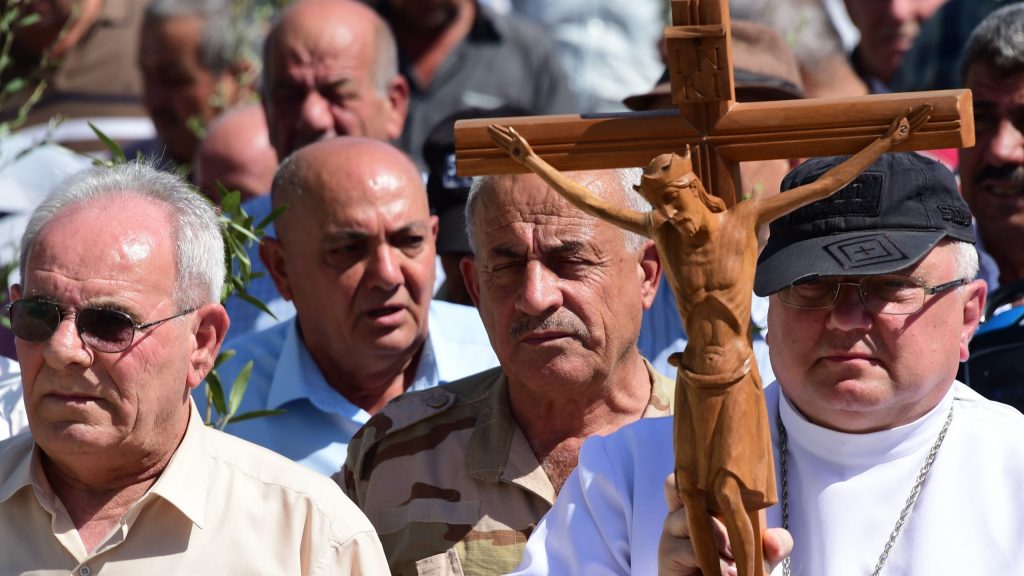More Christian families left the Nineveh Plains than returned to their hometowns last year amid ongoing security concerns in northern Iraq, according to a recently published report by Aid to the Church in Need.
The report, “Life after ISIS: New challenges to Christianity in Iraq,” documents how Iraqi Christians’ worries over Iran-backed militias operating in their region drive emigration and economic insecurity.
“Christians who have returned to their homes still feel unsafe, and substantially more insecure than other groups in the region mostly because of the violent activity of local militias,” Fr. Andrzej Halemba, the leader of ACN’s Nineveh Reconstruction Committee, wrote in the report’s foreword.
“Although economic concerns, especially employment, are paramount in some areas, it is impossible to decouple these from security considerations. These key factors need to be addressed to tackle the physical and economic insecurity that forces populations to move. If the tendency to emigrate is not stemmed, it will place, in turn, even greater pressure on Christians remaining in Iraq by reducing their critical mass and thus creating a less hospitable environment,” he said.
The ACN report found that 57% of Iraqi Christians surveyed said that they had considered emigration. Among them, 55% responded that they expect to leave Iraq by 2024.
The number of Christians living in areas formerly occupied by the Islamic State has already declined from 102,000 to 36,000 people since 2014. The report stated that some displaced Christians who returned to the Nineveh Plains as their homes were rebuilt are now choosing to leave.
“In the summer of 2019, the Christian population of this region reached an inflection point, with more families leaving their hometown than returning. In Baghdeda alone, 3,000 Syriac Catholics left over the course of just three months in 2019 – a drop of 12% in the number of Syriac Catholics in the town,” it said.
With continued migration, the future of the Western Neo-Aramaic language known as Surith, and sometimes called “Syriac,” is also threatened if the children of immigrants do not retain the language. One Christian in Bartella told ACN: “Learning Syriac is important because it’s the language of Jesus.”
The report named Australia as one of the primary locations where Iraqi Christians emigrate, with at least 139,000 moving there since 2007.
This is in part made possible by Iraqi Christians’ family connections abroad. The study found that most Christians had at least one family member living abroad, which provides an added incentive and knowledge of how to leave Iraq.
However, the majority of the Iraqi respondents to the ACN survey cited security concerns over family reasons as the primary reason for wanting to emigrate.
In particular, living under an Iran-backed militia was directly correlated with feelings of insecurity. These Shia militia groups operate with the permission of the Iraqi government, but they have previously refused to comply with the prime minister's instructions to integrate into the Iraqi army.
The ACN report detailed Christians’ complaints of theft, threats of violence, and injury perpetrated by these militia groups, which have been sanctioned by the U.S. government for human rights abuses.
Additionally, many Iraqi Christians live with the fear that the Islamic State or a similar group will return. The survey conducted by ACN found that 87% of these Christians felt unsafe or absolutely unsafe, and 67% believed that “it is likely or very likely that ISIS or a similar group will return in the next five years.”
“Disputes between the central government in Baghdad and the Kurdistan Regional Government over certain Christian-majority areas have also hindered infrastructure reconstruction provoking further insecurity,” Halemba said.
The priest underlined that reconstruction efforts in the Nineveh Plains needed to continue, adding that the number of families in the immediate region that would still like to return is estimated to be more than 2,000.
The report, published in June, is based on a stratified sampling survey conducted between August and November 2019 of 793 Christians living in areas formerly occupied by the Islamic State in the Nineveh Plains. The report was written by Halemba and Xavier Bisits, a management consultant for Bain & Company and ACN project support officer.
The authors said that the survey’s results indicated that NGOs, churches, and governments should focus on the causes that drive Iraqi Christians to emigrate and advocate for the restoration of security in the Nineveh Plains in partnership with local Church leaders.
“The findings of ‘Life after ISIS’ make clear that restoring the stability of the Christian community in this post-conflict region is only possible with a concerted effort focusing on security, education, long-term economic opportunities, and reconstruction,” Halemba said.

